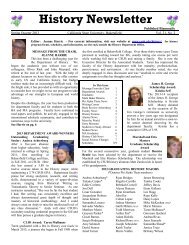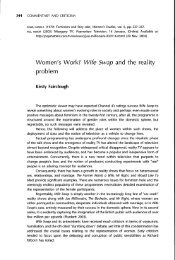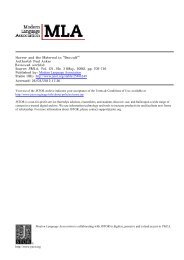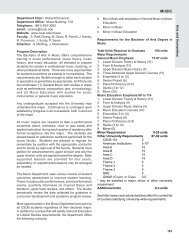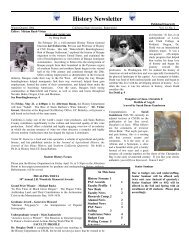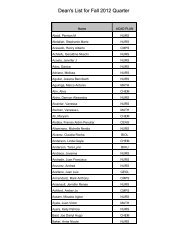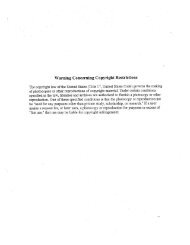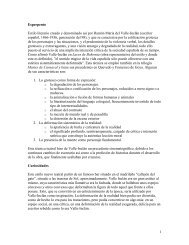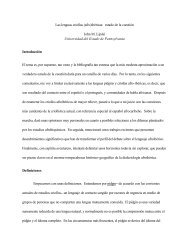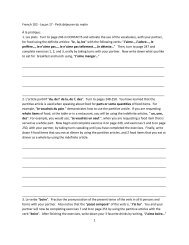''Don't Ask me, I'm Just a Girl'': Feminism, Female Identity, and The ...
''Don't Ask me, I'm Just a Girl'': Feminism, Female Identity, and The ...
''Don't Ask me, I'm Just a Girl'': Feminism, Female Identity, and The ...
You also want an ePaper? Increase the reach of your titles
YUMPU automatically turns print PDFs into web optimized ePapers that Google loves.
Don’t <strong>Ask</strong> <strong>me</strong>, I’m <strong>Just</strong> a Girl 299<br />
Malibu Stacy’’ by Bill Oakley <strong>and</strong> Josh Weinstein. <strong>The</strong> fact remains<br />
that <strong>The</strong> Simpsons is primarily produced, written, directed, <strong>and</strong> even<br />
animated by a stable of <strong>me</strong>n. This point is offered not as a critique of<br />
the possible limitations these individuals might have by virtue of their<br />
sex, but instead as a reminder of the ability of the show’s writers—<br />
both male <strong>and</strong> female—to transcend essentialist notions of authorship<br />
<strong>and</strong> to produce a mainstream television show that contains an overt<br />
feminist sensibility.<br />
Admittedly, progressive representations of wo<strong>me</strong>n in A<strong>me</strong>rican mass<br />
<strong>me</strong>dia are still quite rare. Indeed, in recent years there appears to have<br />
been yet another ‘‘backlash’’ against the image of strong <strong>and</strong> independent<br />
wo<strong>me</strong>n, brought on in part by the return to a conservative<br />
political agenda at the start of the new millennium. However, it is<br />
potentially detri<strong>me</strong>ntal to cast an examination of <strong>me</strong>dia forms into<br />
such a dichotomized schema. Living in a largely dichotomized world,<br />
we are quick to label representations of wo<strong>me</strong>n in the mass <strong>me</strong>dia as<br />
either ‘‘positive’’ or ‘‘negative’’ or, in more academic terms, ‘‘empowered’’<br />
or ‘‘disempowered.’’ But things are rarely so simple, as <strong>The</strong><br />
Simpsons admirably demonstrates. In her provocative examination of<br />
wo<strong>me</strong>n in the mass <strong>me</strong>dia, Madcaps, Screwballs & Con Wo<strong>me</strong>n, Lori<br />
L<strong>and</strong>ay argues that representations of female ‘‘weakness’’ <strong>and</strong> ‘‘power’’<br />
are not really contradictory but are instead ‘‘two streams of feeling<br />
which commingle <strong>and</strong> feed each other’’ (192). In other words, traditional<br />
<strong>and</strong> progressive ideologies of ‘‘femininity’’ <strong>and</strong> ‘‘womanhood’’<br />
exist simultaneously, in both the mass <strong>me</strong>dia <strong>and</strong> the culture itself, <strong>and</strong><br />
at this particular mo<strong>me</strong>nt in A<strong>me</strong>rican history they remain in conflict.<br />
As noted above, many wo<strong>me</strong>n’s lives today are marked by such conflict,<br />
<strong>and</strong> this is a reality that is reflected—<strong>and</strong> reflected upon—in the text of<br />
<strong>The</strong> Simpsons. As Barry Hodge succinctly claims, ‘‘<strong>The</strong> Simpsons doesn’t<br />
constitute an ‘‘out-<strong>and</strong>-out’’ feminist text, but one of a feminine culture<br />
asserting its values within <strong>and</strong> against patriarchy.’’ This seems to<br />
be precisely the underst<strong>and</strong>ing of the show that the editors of Ms.<br />
magazine were articulating with their claim that Lisa Simpson ‘‘wages<br />
a one-girl revolution against cartoonl<strong>and</strong> patriarchy’’ (48). What <strong>The</strong><br />
Simpsons offers viewers regarding female identity is a complex combination<br />
of ‘‘strength’’ <strong>and</strong> ‘‘weakness’’; in other words, of activism <strong>and</strong><br />
submission, of protest against <strong>and</strong> acquiescence to male dominance <strong>and</strong><br />
patriarchal structures. It is through this lens, then, that we can<br />
perhaps best underst<strong>and</strong> the ending of an episode like ‘‘Lisa vs. Malibu



